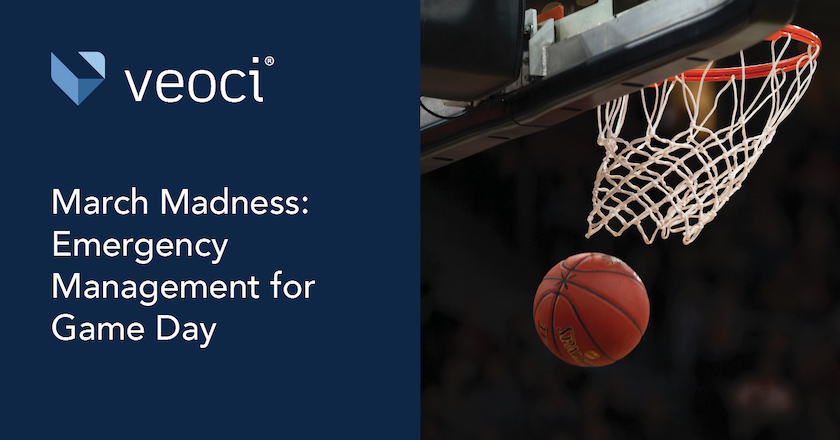What happens when tens of thousands of fans pack into an arena to watch two of the best college sports teams in the country play for it all?
For most, it’s a fun few hours of entertainment with their friends and families. But emergency managers at colleges and universities participating in the NCAA tournament are faced with a big challenge during this yearly tradition.
Special events like commencement already command a distinct plan from emergency managers. Game day, especially for an event like the NCAA tournament, adds a number of wrinkles to the normal special event plan. The spirit of fans and students, the uncertainty of each game’s results, and the length of the tournament are all big factors. So, what should a game day plan look like?
Game Day Solution Essentials
Because game day (and NCAA tournament in particular) is such a large and unique event, emergency managers at participating institutions need plans tailored to the circumstances.
What internal and external stakeholders do you include? What special operations and data intake do you need processes for? How do you keep an eye on the tens of thousands of fans celebrating as their team drives further into the game?
Should this plan mirror plans made for other scenarios and special events? It can in some aspects. But one thing it must do is account for the unique variables game day comes packaged with.
Annexes: An All Possibilities Game Plan
Game day pumps up fans and students, and with that hype comes the chance that almost anything can happen.
Realistically, a game day plan needs to account for a certain number of possibilities. Attendees may get hurt in the festivities, celebrations outside the arena can spill over into campus, or post-game gatherings can snowball into more dangerous environments. A game day can go very smoothly with the right preparation despite smaller incidents doing their best to throw things off course. Without plans for each type of incident, the shuffle to get one incident under control may cause uncertainty and limit the ability of stakeholders to respond to other incidents.
Common Operating Picture: Playing as a Team
A lot of internal and external parties are involved throughout game day, all of them interacting with the event. This creates a lot of little threads, and it benefits all stakeholders to be aware of these threads and how each one is shaping the event overall.
Emergency managers planning for game day need to ensure that they can build a common operating picture every stakeholder can access throughout the event.
Creating this level of situational awareness is no small feat, though. The information needs to include general updates, developing incidents, potential change in plans, and shifts in strategy. Emergency managers need a common space all stakeholders can access to find this bevy of information.
What may be more important is how all of this information is organized. Security personnel may only find use in information about disruptive incidents, for example, and finding that data in a bucket with everything else will only slow them down. The common space emergency managers build should also be capable of sorting information, closing the gap between stakeholders and relevant event information.
Notifications: Communication is Key
Some developments require a more urgent approach. And when these incidents start, you need to get all the right stakeholders looped in.
Notifications are another critical component of game day. Emergency managers need to have notifications ready to send out to ensure stakeholders see important information and can respond quickly to incidents.
If possible, emergency managers should build templates for notifications so the process becomes as simple as pressing a few buttons. Lists of key personnel and other stakeholders, like the security team or leadership, also cut down the time between an event and getting the word out.
Analytics and Review: Review Some Film
After everyone leaves the arena, there’s still something for emergency managers to do.
Emergency management and planning is a process of constant improvement. Every event has twists and turns no one could have predicted, and the only way to get those new insights into plans is through after-action review.
Did a crowd gather unexpectedly in an area? Were there more medical response incidents than anticipated? A review, aided by analytics, will ease out these findings and allow you to plan for them in the future. Analytics enhance the review process, and emergency managers with game day plans should find ways of bringing those numbers into their planning process.








